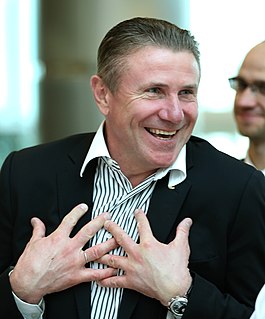A Quote by Kenneth C. Griffin
In some industries, we refer to risk taking as 'research and development.' At financial institutions, we often take risk by investing in securities.
Related Quotes
Growth requires risk-taking. If you want to dampen risk and make sure you never have a problem, you do so, but that also will have an effect on growth. This is a decision that doesn't necessarily belong to financial institutions. It belongs to regulators and legislators who represent the body politic.
Given the central role of effective, firmwide risk management in maintaining strong financial institutions, it is clear that supervisors must redouble their efforts to help organizations improve their risk-management practices...We are also considering the need for additional or revised supervisory guidance regarding various aspects of risk management, including further emphasis on the need for an enterprise-wide perspective when assessing risk.
Basically if you study entrepreneurs, there is a misnomer: People think that entrepreneurs take risk, and they get rewarded because they take risk. In reality entrepreneurs do everything they can to minimize risk. They are not interested in taking risk. They want free lunches and they go after free lunches.

































